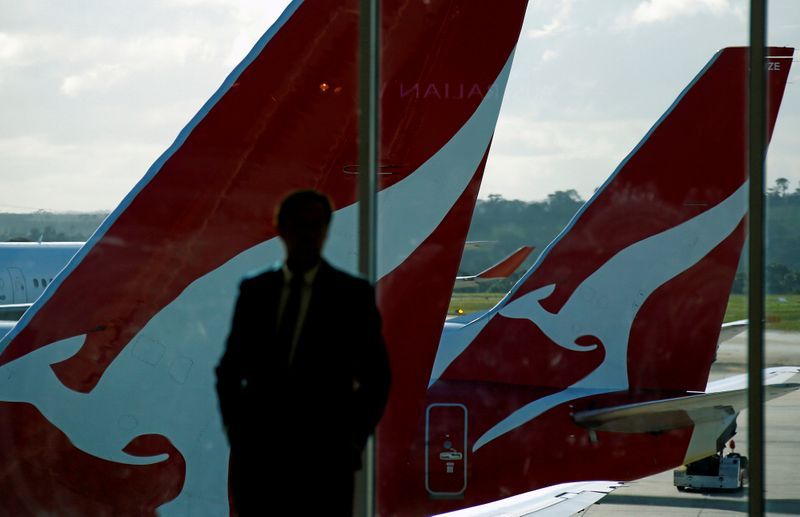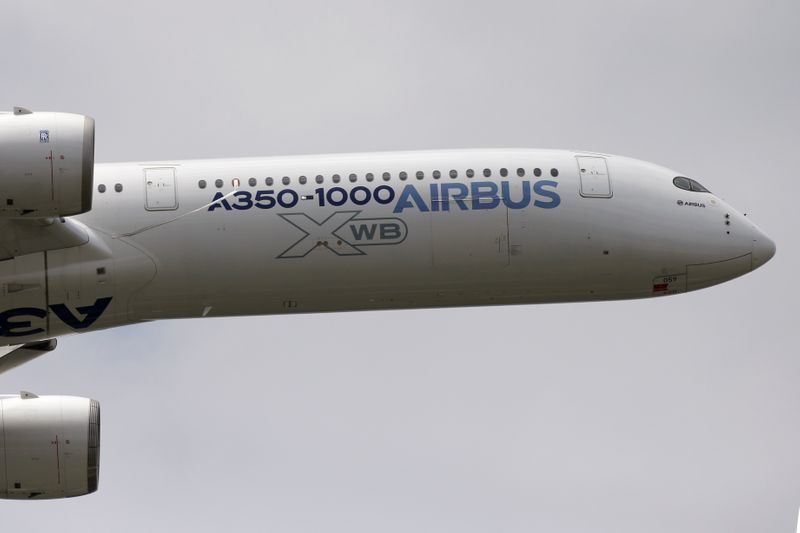
SYDNEY (Reuters) – Qantas Airways Ltd <QABSY> said on Friday it has chosen Airbus SE <EADSY> as preferred supplier for jets capable of the world’s longest commercial flights from Sydney to London, beating rival Boeing Co <BA> after a hard-fought contest.
The choice of up to 12 A350-1000 planes fitted with an extra fuel tank for flights of up to 21 hours cements Airbus as the leader in ultra-long haul flying globally at a time when Boeing is battling delays on its rival 777X programme and a broader corporate crisis following two deadly 737 MAX crashes.
The Qantas flights would begin in the first half of 2023, but remain subject to reaching a pay deal with pilots, who would need to extend their duty times to around 23 hours to account for potential delays and switch between flying the A350 and the airline’s current A330 fleet. A final decision on an order is expected in March, the airline said.
Qantas Chief Executive Alan Joyce said the airline “had a lot of confidence” in the market for non-stop services from Sydney to London and to New York based on two years of flying non-stop from Perth to London, where it has achieved a 30% fare premium over one-stop rivals in premium classes.
“The A350 is a fantastic aircraft and the deal on the table with Airbus gives us the best possible combination of commercial terms, fuel efficiency, operating cost and customer experience,” he said.
Singapore Airlines Ltd <SINGY> operates the world’s current longest flight, nearly 19 hours from Singapore to New York, using an ultra-long range version of the smaller A350-900.
Airbus Chief Commercial Officer Christian Scherer thanked Qantas for its selection in a statement, while a Boeing spokesman said it was disappointed with the decision but looked forward to continuing its longstanding partnership with the airline.
Rico Merkert, a transport professor at the University of Sydney Business School, said the A350-1000 fit the Qantas brief well and was the safer choice, given Boeing has recently reported problems such as the grounding of the 737 MAX, structural cracks in 737 NGs and a fuselage split in a stress test of its 777-9.
“The A350 just seems to be a much safer bet,” he said. “And safety is at the core of everything that Qantas does including its brand.”
Airbus no longer provides list prices for aircraft, but based on its 2018 price list, the Qantas order could be worth up to $4.4 billion before heavy discounts that are standard for airline customers.
Citi on Friday estimated the planes would cost A$3 billion (1.6 billion pounds) to $3.5 billion, with the investment likely to be phased over three years.
The selection of the A350-1000 will add to growing doubts over Boeing’s plans to produce the 777-8 that it had proposed to Qantas for the mission.
Boeing had already said the entry into service for the plane, a smaller, longer-range version of the 777-9, would be delayed beyond 2022 but has declined to give a new date, saying it would be based on customer demand.
Customers Emirates and Qatar Airways have indicated they could switch orders for the 777-8 to the 777-9.
The 777-9 is due to enter service in 2021, following delays associated with its GE <GE.N> engines.
The Boeing spokesman said on Friday the manufacturer was focused on the development of the 777-9 and after that it would complete development of the 777-8, with the first delivery scheduled a few years after that.
(Reporting by Jamie Freed; Editing by Sam Holmes and Stephen Coates)


